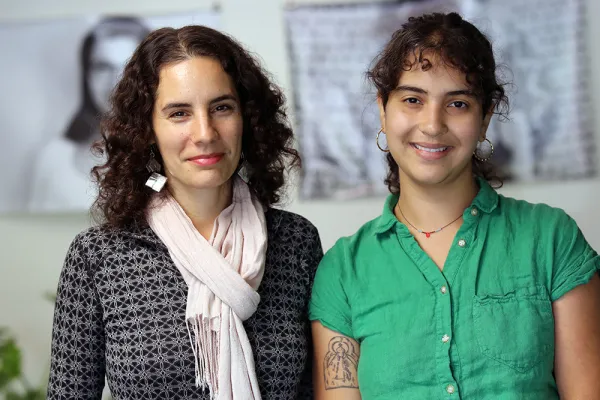Immigration and the Food Justice Connection
Sustainability

Published November 8, 2019
“A lot of people are very enthusiastic about supporting organic agriculture and local food,” says Gabriella Della Croce ’11, “but fewer people, unfortunately, think about who is producing that food and the difficult working conditions that go into producing that food.”
Della Croce and Andrea Schmid ’17 are co-directors and lead organizers at the Pioneer Valley Workers Center (PVWC), a collective that works to enact meaningful change in the lives of immigrant and low-wage workers in western Massachusetts.
The organization has a base of about 300 members, mostly farm and restaurant workers, many from Mexico and Central America. PVWC offers workshops on immigration and labor laws, provides emergency response teams to address raids and deportations, and campaigns for changes in state and local ordinances that negatively affect low-wage workers and immigrants.
Beyond trying to effect change from within the system, Della Croce and Schmid also envisioned creating a workplace that would serve as a model workers’ collective, where everyone’s voice is heard and respected—specifically a worker-run, sustainable farm. It was a natural progression; many of PVWC’s members from other countries have a farming background, but worker abuse is rampant in the farm industry here in America. “The federal minimum wage for farm workers is significantly lower than that of any other low-wage worker," says Schmid. “And, some of the biggest issues involve basic necessities: folks not having access to bathrooms and drinking water or bosses not giving anyone breaks.”
That long-range vision became a reality last spring, when PVWC was offered the use of four acres of dormant farm land in Hatfield, Massachusetts.
Six PVWC members formed the core of the farm project, despite holding down six-day-a-week jobs on other people's farms. Every Sunday—their day off—the workers along with PVWC staff and dedicated volunteers were in Hatfield attempting to ready the land—a virtual swamp due to a wet spring—for planting a variety of crops.
>
The farm co-op’s first season was such a success that it generated enough crops to sell locally. “That’s a really big deal,” says Schmid. “It’s so empowering for the members to go from generating a concept last winter to actually harvesting crops on their own farm.”
One group of volunteers helping at the farm co-op over the summer included Smith students from Professor Elisabeth (Lisa) Armstrong’s Gender, Land and Food Movements class.
“I call this sweat equity,” Armstrong says. “We can't figure out how to think alongside social movements without doing the work alongside social movements. The PVWC farm is allowing us to think about how we reorganize the world so that we are living more sustainably, so that people are eating enough food, people are providing for themselves in a way that feels healthy, communitarian and equitable.”
Long-term goals for the farm are to provide workers with stable livelihoods with good working conditions and a democratic workplace structure, as well as providing a community space. “We want to create and promote institutions that reflect what people are fighting for, “Schmid says, “not a Band-Aid for the problem, but real structural change.”
Adds Della Croce, “It’s ironic that many of our members work on farms that produce beautiful, abundant, organic produce, which the workers could never afford to buy for their own families, so the farm will also open up access to organic produce for our whole member base and, hopefully, beyond.”
Cheryl Dellecese is associate director of alumnae communications at Smith College
As part of their work at the Pioneer Valley Workers Center, Gabriella Della Croce ’11 and Andrea Schmid ’17 have helped to start a co-op farm run by immigrant workers.